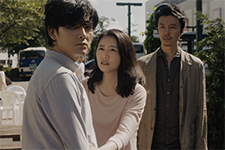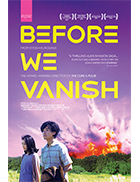Before We Vanish (Sanpo suru shinryakusha)
|  In Kiyoshi Kurosawa's off-beat alien invasion drama Before We Vanish (Sanpo suru shinryakusha), three alien entities take over the bodies of various Japanese citizens and go about reconnaissance work prior to an intended invasion, which involves them harvesting "concepts" in order to better understand the human race. This "concept harvesting" requires them to engage another person in a discussion of an abstract idea-home, family, work, etc.-and once that idea is fully formed in the person's mind, the alien gives them a light touch on the forehead and boop!, the person crumbles to the ground and then awakens, suddenly and irrevocably relieved of the concept that has been harvested. It is a fascinating, at times funny, and at other times tragic merging of the paranoid Invasion of the Body Snatchers-style sci-fi trope of not being able to trust that the people around us are who they say they are and the horror trope of not being in control of our own minds (or having our minds stolen from us). In Before We Vanish, though, both tropes are given a curious tweak in that the aliens are quite forthright and refreshingly honest about what they are and why they're here (not that most people believe them-at least at first) and they don't take over someone's entire mind, but rather steal a single concept, which in some cases liberates the victim. A misogynistic, workaholic boss, for example, turns out to be a much nicer, much more fun person once he loses the concept of work. The three alien-invaded hosts, who retain all of their knowledge and memories, are Shinji (Ryuhei Matsuda), a young businessman who is in a particularly rocky patch with his wife, Narumi (Masami Nagasawa); Akira (Yuri Tsunematsu), a generally unremarkable young man; and Amano (Mahiro Takasugi), a schoolgirl who opens the film's explicit bit of misdirection by slaughtering her entire family and causing a massive wreck as she saunters down the road, splattered with blood (for the first three minutes, it appears that we are deep in the realm of graphic, postmodern horror, but we aren't). Each of the aliens needs a human "guide" to lead them around, a role that is filled for Shinji by his wife and for Akira by a cynical reporter named Sakurai (Hiroki Hasegawa) who is assigned to cover the story of the family slaughtered by Amano, who quickly winds up in police custody. Kurosawa and co-writer Sachiko Tanaka (who previously worked together on Kuroawaw's highly acclaimed 2008 family drama Tokyo Sonata) have fun with the aliens' often awkward, sometimes just plain weird attempts to "play human" (Shinji, for example, reads a magazine upside down and Akira tries way too hard to use hip language, constantly calling Sakurai "dude"). Yet, as the film progresses, they adapt more and more to their human forms, and not surprisingly begin to develop relationships with their human guides, which in the case of Shinji and Narumi is particularly bittersweet because Shinji turns out to be a better husband once he's been invaded by an alien whose chief concern is listening and paying attention to the people around him. Kurosawa, who began his career in the late 1980s and '90s as a particularly stylish purveyor of various strains of J-horror but has since branched out into increasingly ambitious endeavors outside of strict genre material, is never anything less than interesting, and Before We Vanish offers him an intriguing mash-up of B-sci-fi plot mechanics and loftier philosophical aspirations. The film is based on the 2005 play Sampo suru shinryakusha (Strolling Invader) by Tomohiro Maekawa, who for the past 15 years has shaken up the world of contemporary Japanese theatre with his supernatural plays about aliens, the occult, time travel, and the end of the world. Kurosawa's adaptation doesn't always work and, as with a number of his more recent films, is decidedly too long, running a good 20 to 30 minutes longer than it probably needs to. But, despite some lulls in the middle section and too much repetition, it is still hard not to be drawn into the film's idiosyncratic drama of alien-human relations, which is punctuated by upbeat, jangly music that plays in stark contrast to the constant, overarching threat of planet-wide invasion and the extermination of the human race. Copyright © 2018 James Kendrick Thoughts? E-mail James Kendrick All images copyright © Super LTD |
Overall Rating: 

 (3)
(3)


